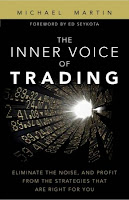Michael Martin was kind enough to recently send over a review copy (via the FT Press) of his new book, The Inner Voice of Trading.
I've started reading through the book and have highlighted an important lesson on risk mgmt., ego, and the emotions we feel as humans who trade.
Here are a few thoughts from chapter 2 of Michael's book, paraphrased or direct quotes, that address some of these issues:
• Most traders drawn to risk management focus on the external "how to" aspect of trading, vs. the inner aspect of emotions and psychology. This is where trouble begins.
• Our American education system has ingrained in us the need for accuracy and regurgitation of info. We become conditioned to this accuracy model and the rewards of rote learning. The longer we remain in this reward model, the more it colors everything we do in life.
• In the school model, one's self-esteem is tied to being right. Avoiding mistakes, especially public mistakes becomes paramount. But in trading, one can be wrong in most choices and experience regular "outlier" events in the course of trading the markets. Traders must somehow learn that they will miss out or be incorrect regularly and still have a shot at great success.
• Traders need to have a survival plan. Know when you will get out of a trade before you get in.
• If you don't take the small loss today, your capital and trading career may not survive tomorrow.
• The most successful traders surrender their egos to not knowing the frequency or magnitude of any trend. They quiet their mind and follow their inner voice.
• Most of the world can't keep their losses small. Professional traders and investors who've been around for decades are usually those who play the best defense.
I'll try to review the book in full after I've finished reading it. Till then, check out Michael's book along with this interview on The Inner Voice of Trading, and visit Martin Kronicle for more on trading from Michael and his interview guests.
I've started reading through the book and have highlighted an important lesson on risk mgmt., ego, and the emotions we feel as humans who trade.
Here are a few thoughts from chapter 2 of Michael's book, paraphrased or direct quotes, that address some of these issues:
• Most traders drawn to risk management focus on the external "how to" aspect of trading, vs. the inner aspect of emotions and psychology. This is where trouble begins.
• Our American education system has ingrained in us the need for accuracy and regurgitation of info. We become conditioned to this accuracy model and the rewards of rote learning. The longer we remain in this reward model, the more it colors everything we do in life.
• In the school model, one's self-esteem is tied to being right. Avoiding mistakes, especially public mistakes becomes paramount. But in trading, one can be wrong in most choices and experience regular "outlier" events in the course of trading the markets. Traders must somehow learn that they will miss out or be incorrect regularly and still have a shot at great success.
• Traders need to have a survival plan. Know when you will get out of a trade before you get in.
• If you don't take the small loss today, your capital and trading career may not survive tomorrow.
• The most successful traders surrender their egos to not knowing the frequency or magnitude of any trend. They quiet their mind and follow their inner voice.
• Most of the world can't keep their losses small. Professional traders and investors who've been around for decades are usually those who play the best defense.
I'll try to review the book in full after I've finished reading it. Till then, check out Michael's book along with this interview on The Inner Voice of Trading, and visit Martin Kronicle for more on trading from Michael and his interview guests.
